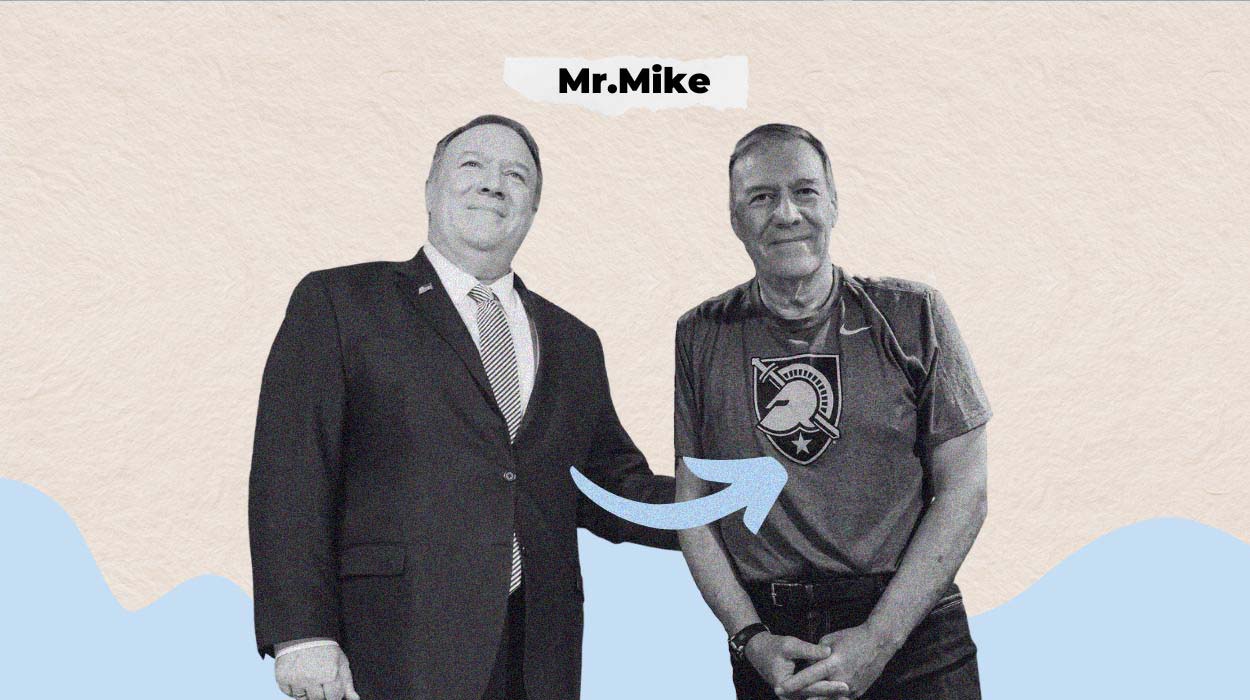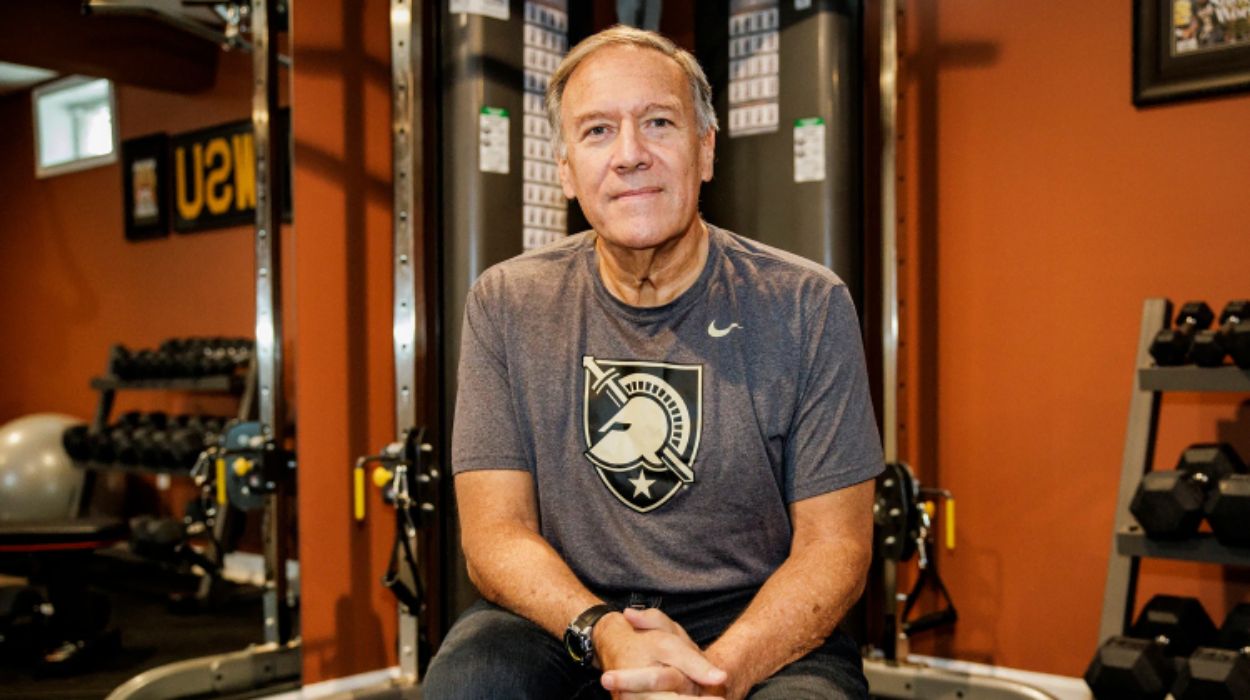 Expert's opinion
Expert's opinion
Expert's opinion
The article is a subjective view on this topic written by writers specializing in medical writing.
It may reflect on a personal journey surrounding struggles with an illness or medical condition, involve product comparisons, diet considerations, or other health-related opinions.
Although the view is entirely that of the writer, it is based on academic experiences and scientific research they have conducted; it is fact-checked by a team of degreed medical experts, and validated by sources attached to the article.
The numbers in parenthesis (1,2,3) will take you to clickable links to related scientific papers.
Mike Pompeo Weight Loss 2024: Lose 90 Pounds In 6 Months

Mike Pompeo, formerly the Director of the Central Intelligence Agency and Secretary of State during the Trump administration, has been making headlines lately, not for his political influence but for his recent dramatic weight loss.
Pompeo reports losing 90 pounds over six short months. How did Mike Pompeo weight loss? The intriguing part? He claims to have done it independently without surgery, nutrition counseling, or personal training.
When you see Mike Pompeo’s dramatic weight loss pictures, there’s certainly no denying his physical transformation. But it’s not the transformation that has dietitians and other health professionals on alert- it’s the headlines that discuss his rapid weight loss methods that give medical professionals pause.
Because of its manipulative tendencies, diet culture wants us to believe losing that much weight in such a short time is attainable. But is it? This article will review the science of weight loss and how to safely and effectively lose weight, despite how the popular headlines read.
Key Takeaway
- Mike Pompeo made nutrition changes, eating smaller portions and cutting carbs. He aimed for 30-minute workouts five to six times a week.
- Everybody is unique, and weight loss journeys vary. What worked for Mike Pompeo may not work for you.
- Some useful tips to lose weight safely and faster include getting active, staying hydrated, eating more fiber, etc.
Mike Pompeo Weight Loss
Just how much weight did Mike Pompeo lose? If the reported figures for Pompeo’s weight loss are accurate, he shed roughly 90 pounds, which accounts for about 30% of his initial weight, in just six months.
According to reports, Pompeo simply changed his eating habits and began working out regularly.
Pompeo installed a home gym in his basement that consisted of dumbbells and an elliptical machine, and he would aim to work out for approximately 30 minutes five to six times per week.

Regarding his nutrition changes, Pompeo reports he simply ate smaller portions and severely reduced his carbohydrate intake. He also reports that he now chooses “healthier options” when eating at restaurants like IHOP, a family favorite.
For example, he is on record saying he now goes for egg whites and turkey bacon instead of pancakes or pumpkin pancakes.
Pompeo denies any surgical intervention or guidance from dietitians or personal trainers. Furthermore, there is no mention of weight loss supplements or fat burners, just a simple calorie deficit resulting from reduced dietary intake and increased physical activity.
How Did Mike Pompeo Lose Weight?
It’s estimated that over 40% of adults[1] in the United States are obese. Perhaps that’s why so many people are intrigued by Secretary Mike Pompeo’s weight-loss diet.
According to Pompeo, he increased his physical activity and reduced his calorie intake to create an overall calorie deficit. Seems pretty straightforward, right? In theory, yes.
However, to lose 90 pounds in six months, you need to lose an average of 3.4 pounds per week. That means you would have to be in a calorie deficit of approximately 1700 calories per day for the entirety of those six months.
Unfortunately, while it is technically possible, it may be far-fetched and may not be safe for the average person. It’s important to remember that all bodies are different, and no two weight loss journeys are the same. What worked for Mike Pompeo may not work for you.
The Centers for Disease Control and Prevention (CDC) recommends no more than a 1-2 pound[2] weight loss per week. You started gaining weight at a rate of 3 pounds a week, it didn’t; it happened gradually, just as your weight loss should.
Furthermore, losing that much weight without any professional guidance or medical supervision isn’t recommended.
According to the National Heart, Lung, and Blood Institute under the U.S. Department of Health and Human Services, if you plan to lose more than 15 to 20 pounds[3], it’s best to be evaluated by a physician.
Useful Tips To Lose Weight Fast & Safely

There’s so much weight to losing weight than just the number on the scale. Weight can affect your overall health, but body size is not a direct indicator of health. The reason you decide to lose weight and the method by which you go about it matter.
If weight loss will improve a chronic medical condition or your overall health, or even if it would help boost your confidence and embrace your life fully, it’s essential to do it safely. Try these helpful tips:
Get Active
Weight loss occurs when your body is in a calorie deficit. In addition to its other numerous benefits, physical activity is an efficient way to help promote a calorie deficit.
According to the CDC[4] guidelines, the average adult needs 150 minutes of moderate-intensity physical activity and two days of muscle strength training weekly.
You can opt to divide those 150 minutes into daily segments for your exercise regimen or schedule your home gym days to fit your routine. (You shouldn’t do all 150 minutes at one time, once a week!) If exercise is new to your healthier lifestyle, talk with your doctor before beginning any workout regimen.
Stay Hydrated
Hydration is a vital part of a well-balanced diet. Without water, the body can’t metabolize stored fat or carbohydrates. One recent animal study[5] even connected proper hydration to weight loss effects through increased lipolysis and loss of fat.
Increased hydration can also act as a natural appetite suppressant. When your stomach senses it’s full, it sends satiety signals to your brain.
One recent study[6] showed a link between drinking water before meals and a reduction in body fat, overall body weight, and body mass index (BMI). Dehydration, besides being counterproductive to the above, can also play havoc with your electrolytes, increasing the tendency to cramp or fatigue easily.
Don’t Forget Fiber
Fiber is extremely important. Studies often focus on its role in satiety[7], but it also offers many other benefits. For example, getting adequate fiber each day helps promote healthy digestion and maintain a healthy balance of bacteria in the gut (microbiome).
Besides fiver and its effect on the microbiome, satiety is a complex interplay among rising blood sugar, insulin release, and rising lepton.
Plan Ahead
Meal planning avoids situations with limited options, preventing hasty and unhealthy choices due to extreme hunger when life gets busy. These are common times when overeating gets the best of us.
Planning ahead doesn’t mean you have to avoid all your favorite foods. The beauty of planning is that you can responsibly include some favorites. There are certainly times when you can enjoy less nutritious foods; just keep it in moderation.
Keep healthy snacks accessible in your purse, car, or office, and plan your meals and prep in advance to simplify cooking on busy days.
Set The Scene
Life is hectic, and your list of things to do is growing by the second. However, if you aim to lose weight, it’s essential to be in the moment when eating.
So, set the scene. Try to slow down and sit to eat your meals and snacks. Let yourself enjoy your meal. Our brains take time to process the feeling of fullness, i.e., the glucose, insulin, and leptin mechanism.
Unfortunately, we often eat so quickly that our brains can’t keep up, and before we know it, we’ve overeaten.
Meet Your Protein Needs
Meeting your protein needs is crucial, but calorie counting can be tedious and restrictive. Instead, prioritize a balanced diet with sufficient daily protein.
Research has shown a connection between increased protein intake and overall energy intake, metabolism, and appetite regulation.
However, everyone’s protein needs are different, as they are influenced by body composition, activity level, and other biological demands. Your registered dietitian can help you calculate your daily protein needs and ways to meet those needs.
Get Adequate Sleep
We sometimes forget that our bodies are well-oiled machines, and if we don’t provide them with the rest they need, things can get thrown out of wack. Your body depends on sleep hygiene for proper functioning.
The mind-body connection is real, with health in each augmenting health in both.
Your brain is as busy at night as it is during the day, consolidating memory, combining experiences, and discarding useless information; also, it removes the debris[8] from the day’s mental work.
When it comes to losing weight, research[9] suggests a connection between adequate sleep and successful efforts. So much so that insufficient sleep can actually work against weight loss interventions.
Consistency Is Key
To lose weight effectively, adopt new habits, and maintain consistency with your wellness routine for long-term success.
Increased exercise paired with beneficial dietary changes will lead to results, but it will take time. Try not to compare your weight loss journey to someone else’s, and know that even if you don’t see results overnight, you have much to be proud of.
The Bottom Line
Our bodies are not designed to look the same, which is a beautiful thing. So, when you come across stories like Mike Pompeo’s, remember that it is his personal story, and we only know a snippet of it.
Take it with a grain of salt and focus on your individual journey, ideally with the support of your doctor and registered dietitian nutritionist.
+ 9 sources
Health Canal avoids using tertiary references. We have strict sourcing guidelines and rely on peer-reviewed studies, academic researches from medical associations and institutions. To ensure the accuracy of articles in Health Canal, you can read more about the editorial process here
- and, D. (2022). Overweight & Obesity Statistics. [online] National Institute of Diabetes and Digestive and Kidney Diseases. Available at: https://www.niddk.nih.gov/health-information/health-statistics/overweight-obesity#prevalence
- CDC (2022). Losing Weight. [online] Centers for Disease Control and Prevention. Available at: https://www.cdc.gov/healthyweight/losing_weight/index.html
- Nih.gov. (2022). Healthy Weight Loss. [online] Available at: https://www.nhlbi.nih.gov/health/educational/lose_wt/wtl_prog.htm
- CDC (2022). How much physical activity do adults need? [online] Centers for Disease Control and Prevention. Available at: https://www.cdc.gov/physicalactivity/basics/adults/index.htm
- Thornton, S.N. (2016). Increased Hydration Can Be Associated with Weight Loss. Frontiers in Nutrition, [online] 3. doi:10.3389/fnut.2016.00018.
- Vij, V.A. and Joshi, A. (2014). Effect of excessive water intake on body weight, body mass index, body fat, and appetite of overweight female participants. Journal of Natural Science, Biology and Medicine, [online] 5(2), p.340. doi:10.4103/0976-9668.136180.
- Rebello, C.J., O’Neil, C.E. and Greenway, F.L. (2016). Dietary fiber and satiety: the effects of oats on satiety. Nutrition Reviews, [online] 74(2), pp.131–147. doi:10.1093/nutrit/nuv063.
- Benveniste, H., Lee, H. and Volkow, N.D. (2017). The Glymphatic Pathway: Waste Removal from the CNS via Cerebrospinal Fluid Transport. The Neuroscientist, [online] 23(5), pp.454–465. doi:10.1177/1073858417691030.
- Chaput, J.-P. and Tremblay, A. (2012). Adequate sleep to improve the treatment of obesity. Canadian Medical Association Journal, [online] 184(18), pp.1975–1976. doi:10.1503/cmaj.120876.



